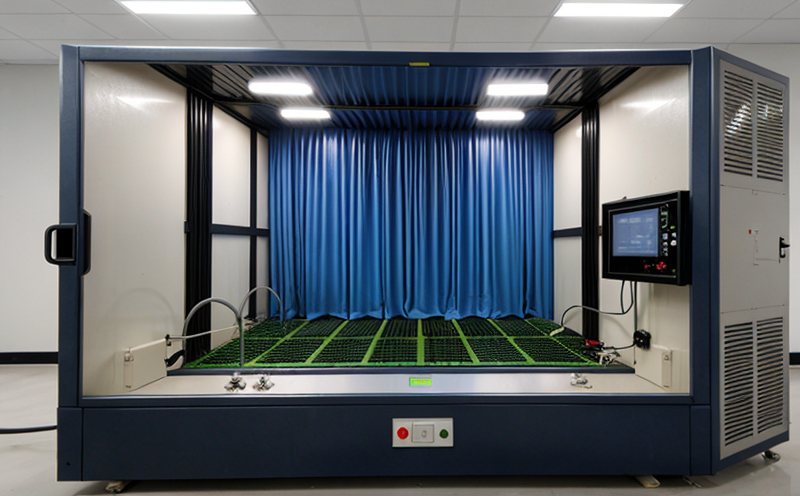ASTM D3451 Environmental Aging Test for Electrical Insulating Materials
The ASTM D3451 environmental aging test is a critical procedure used to evaluate the durability and performance of electrical insulating materials under realistic environmental conditions. This test simulates real-world exposure to heat, light, and moisture, which are known to degrade material properties over time. The primary objective is to assess how well these insulating materials withstand such environmental stresses without compromising their integrity or functionality.
The ASTM D3451 test method involves exposing specimens of electrical insulating materials to a controlled environment that mimics the conditions found in various industrial settings. This includes temperature variations, humidity levels, and exposure to light—all factors that can significantly impact material performance over time. The test is particularly useful for quality managers, compliance officers, R&D engineers, and procurement specialists who need reliable data on how well their materials will perform under actual operating conditions.
The process typically starts with the preparation of the insulating materials into standardized specimens according to ASTM D3451 specifications. These specimens are then exposed to a series of environmental cycles designed to simulate real-world weathering effects. The testing environment can be adjusted for temperature, relative humidity, and light exposure based on specific requirements.
During the test, careful monitoring ensures that all parameters remain within prescribed limits as defined by ASTM D3451. This includes recording temperature changes, measuring humidity levels, and tracking light exposure. Once the specified duration has passed, the specimens are removed from the environmental chamber and inspected for any signs of degradation such as discoloration, cracking, or loss of mechanical strength.
The results obtained from this test provide valuable insights into the long-term reliability of electrical insulating materials used in various applications across different industries. By simulating actual usage conditions, manufacturers can make informed decisions about material selection and design improvements that enhance product performance and extend service life.
For instance, aerospace companies might use ASTM D3451 to ensure their components remain safe and effective throughout prolonged exposure to harsh environments like space or tropical climates. Automotive firms could apply this test to evaluate whether their parts can withstand extreme temperatures during manufacturing or while in use by consumers worldwide. Similarly, manufacturers of electronic devices may rely on these tests to verify that their products meet stringent durability standards before being released onto the market.
Understanding how different environmental factors affect electrical insulating materials is essential for ensuring compliance with regulatory requirements and maintaining high-quality standards within industries. By incorporating ASTM D3451 into their quality control processes, organizations demonstrate commitment to producing safe, reliable products capable of meeting customer expectations globally.
Industry Applications
- Aerospace: Ensuring that insulating materials used in aircraft and spacecraft can endure extreme temperatures and corrosive environments.
- Automotive: Evaluating the durability of electrical components exposed to varying climates during production and use.
- Electrical Engineering: Assessing the reliability of insulation systems employed in power generation facilities subjected to fluctuating temperature conditions.
- Consumer Electronics: Guaranteeing that insulating materials incorporated into consumer goods maintain their integrity when faced with typical household exposure levels.
- HVAC & Refrigeration: Testing insulators utilized in heating, ventilation, air conditioning units and refrigerators exposed to varying humidity rates.
- Telecommunications: Verifying the resilience of insulation used within telecom infrastructure subjected to outdoor weather variations.
These applications highlight just a few examples where ASTM D3451 plays an integral role in ensuring product reliability across diverse sectors. Its ability to replicate real-world conditions makes it indispensable for any organization looking to improve material performance and extend service life.
Eurolab Advantages
At Eurolab, we pride ourselves on delivering comprehensive and accurate testing services that meet or exceed industry standards. When it comes to ASTM D3451 environmental aging tests for electrical insulating materials, our experts utilize state-of-the-art equipment calibrated to precise tolerances ensuring consistent results every time.
- Accurate Data Collection: Our advanced sensors provide real-time data on temperature, humidity, and light exposure throughout the testing process.
- Comprehensive Reporting: After completion of each test cycle, our team generates detailed reports summarizing key findings along with recommendations for improvement where necessary.
- Customized Solutions: Whether you require standard tests or need modifications tailored specifically to your unique needs, Eurolab offers flexible options that suit all budgets and timelines.
- Compliance Assurance: By adhering strictly to ASTM D3451 guidelines during every phase of testing, we help ensure compliance with relevant regulations governing product safety and performance.
Our commitment to excellence extends beyond merely performing tests; it encompasses providing clients with valuable insights based on our extensive experience in this field. With years of expertise behind us, Eurolab stands ready to assist you in meeting your testing requirements efficiently and effectively.
Why Choose This Test
- Realistic Simulation: ASTM D3451 accurately replicates the environmental stresses encountered by electrical insulating materials during actual use, offering more relevant results compared to laboratory conditions alone.
- Predictive Performance: By identifying potential weaknesses early in development stages through rigorous testing procedures, manufacturers can make necessary adjustments before full-scale production begins.
- Regulatory Compliance: Meeting stringent regulatory requirements is crucial for maintaining competitive edge and ensuring product safety. ASTM D3451 helps meet these expectations by providing robust evidence supporting compliance efforts.
- Durability Assessment: Determining the longevity of electrical insulating materials ensures that end users receive products built to last longer, reducing maintenance costs over time.
Choosing ASTM D3451 for your testing needs allows you to gain a comprehensive understanding of how your materials will perform under real-world conditions. This knowledge can lead to improved designs, enhanced product quality, and increased customer satisfaction—all contributing factors towards achieving business success in today’s competitive marketplace.





